| Reviews & Columns |
|
Reviews DVD TV on DVD Blu-ray 4K UHD International DVDs In Theaters Reviews by Studio Video Games Features Collector Series DVDs Easter Egg Database Interviews DVD Talk Radio Feature Articles Columns Anime Talk DVD Savant Horror DVDs The M.O.D. Squad Art House HD Talk Silent DVD
|
DVD Talk Forum |
|
|
| Resources |
|
DVD Price Search Customer Service #'s RCE Info Links |
|
Columns
|
|
|
Jean Genet's Un Chant d'Amour
THE MOVIE:
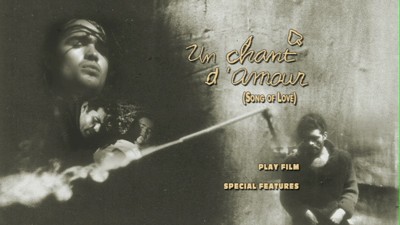
A notorious figure on the mid-20th century literary scene, Jean Genet was well regarded by some and reviled by others for his obsessive and passionate portraits of the love that blossomed in the darkest of places. Bravely pioneering queer literature when the very notion would get a writer arrested rather than earn him plaudits, his florid prose took readers through society's underbelly, finding romance and tragedy in prisons, seaside hovels, and the servant's quarters in supposedly respectable homes. His novels and plays alike broke boundaries, and his work became a rich mine for many a filmmaker. Fassbinder adapted his novel Querelle, Todd Haynes' appropriated his work for Poison, and Tony Richardson transformed a Genet story into the marvelous Mademoiselle.
Before any of those, however, in 1950, Genet made his own short film, the twenty-five minute Un chant d'amour (A Song of Love). Shot in black-and-white and shown completely silent, not even music (though apparently Gavin Bryars wrote a score for it in the 1970s), the poetic film tells the story of a French prison and the lonely men who are trapped within its walls. Though we peek into many of the cells, each with a different but equally hungry criminal expressively yearning for some kind of human contact, our focus is on three in particular, two prisoners and the peeping-tom guard who spies his own desires in theirs.
The two unnamed men, one darker and older, the other younger and distinguished by the femme fatale tattooed on his shoulder, have cells side by side and communicate through a hole in their wall. The older man sticks a straw through the breech and blows his cigarette smoke to his neighbor, a surprisingly intimate act when the younger prisoner chooses to accept it. This image, just like the many fantasy images through the film, is shot in a dreamy manner, made overly dramatic to create a surrealist effect of being in a world of emotion rather than one of rational expression. The most vivid of the images are actually that of the guard's, who sees himself in many an embrace with other men. Are they memories or wishes? On the other hand, the older prisoner has a rather normal dream of sharing a hillside rendezvous with his fellow inmate.
Un chant d'amour is an effective film, albeit a tad clumsy and pretentious. The storytelling style, which owes much to Jean Cocteau (allegedly an uncredited cinematographer alongside Jacques Natteau (Never on Sunday)), ends up coming of as better than it is thanks to the lovely photography. Genet's staging, as well as his editing (which he did himself), is competent but flat. The film comes alive the more abstract it gets, with flowers, cigarettes, and guns all serving as stand-ins for the male sex. They are obvious symbols, but they do work. The flaws are easy to overlook thanks to the sincerity of the endeavor.
In the end, I was moved by Un chant d'amour, but it's not an effect that lasted for very long after. I feel like I should be haunted by the movie, that I should be carrying its images with me. Perhaps it's the fault of the ending, which comes back around like a moebius strip to where it began, and thus arguably negates what happened in an "it was all a dream" manner. Perhaps it's just that in this case, the filmmaker's reach exceeded his grasp. Regardless, Un chant d'amour is still a progressive and interesting experiment worth the time one is willing to put into it.
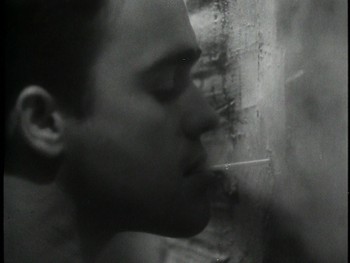
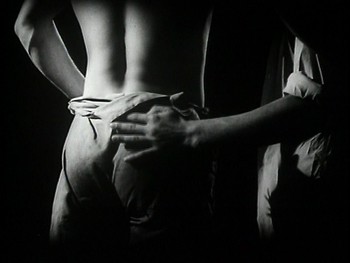
THE DVD
Video:
Un chant d'amour has a checkered history in terms of distribution, never really getting any major release. Thus, I suppose it's not entirely surprising that there may not be the best preserved film elements for the producers to work from. Though boasting a "New Film Transfer," the full-frame image of Un chant d'amour is rather beat-up, with persistent spots and scratches, as well as several mid-scene splices. There is also some interlacing, leading to jagged edges and digital tracers. It's not a terrible or unforgivable transfer, but not a massive restoration, either.
Sound:
None. The extras have very basic mixes, but the main film has no sound whatsoever.
Extras:
Now, it's my understanding that Cult Epics released Un chant d'amour in 2007 as a two-disc set that I have seen still available some places online (at least as of this writing), but other listings have suggested is out of print, being replaced by this single-disc edition. I can't be 100% sure, but I believe the film transfer is the same between the two releases, and from a screenshot I've seen elsewhere, the menu design is exactly the same. What has been lost by compressing the package onto one disc is a 1982 interview with Jean Genet conducted by Bertrand Poirot-Delpech. This means that if you have the previous edition, hang onto it, this new version does not live up to the one in your possession.
The rest of the extras were carried over, however, beginning with the eight-minute introduction by legendary film champion Jonas Mekas. In a piece where Mekas simply sits and talks to the camera, he relates his own history with Un chant d'amour, smuggling a print of the film into the U.S. in 1964 by cutting it up and hiding it in his pockets. He was later arrested for showing the movie in New York.
The second feature is an audio commentary by cult director Kenneth Anger, who shares his impressions of the film and the influence Genet had on his career. It's a good track when Anger is talking, but he loses the momentum quite often.
The most hefty of the extras is the 1981 documentary Genet, directed by Antoine Bourseiller. 51 minutes in length, it's largely an extended conversation with Genet reminiscing about his life, intercut with readings from his work and a brief look at the studio of his artist friend, Alberto Giacometti.
FINAL THOUGHTS:
Recommended, as much for the full package as for the main feature itself. Un chant d'amour, the sole film made by novelist and playwright Jean Genet, is an interesting experiment in expressing the writer's singular aesthetic through cinema. The dream-like short film about the pent-up passions of prison inmates juxtaposed against the repressed desires of their supposedly "free" guard is viscerally effective, if a little slight. The bonus features on the disc, however, round out the whole thing rather nicely.
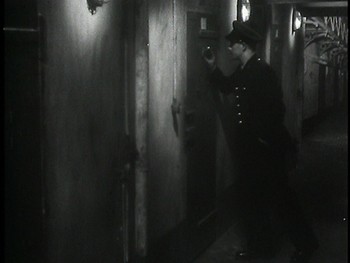
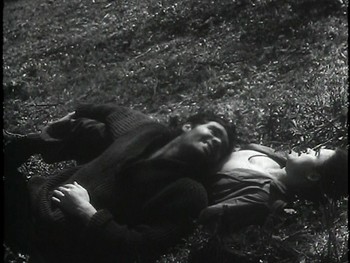
Jamie S. Rich is a novelist and comic book writer. He is best known for his collaborations with Joelle Jones, including the hardboiled crime comic book You Have Killed Me, the challenging romance 12 Reasons Why I Love Her, and the 2007 prose novel Have You Seen the Horizon Lately?, for which Jones did the cover. All three were published by Oni Press. His most recent projects include the futuristic romance A Boy and a Girl with Natalie Nourigat; Archer Coe and the Thousand Natural Shocks, a loopy crime tale drawn by Dan Christensen; and the horror miniseries Madame Frankenstein, a collaboration with Megan Levens. Follow Rich's blog at Confessions123.com.
|
| Popular Reviews |
| Sponsored Links |
|
|
| Sponsored Links |
|
|
| Release List | Reviews | Shop | Newsletter | Forum | DVD Giveaways | Blu-Ray | Advertise |
|
Copyright 2024 DVDTalk.com All Rights Reserved. Legal Info, Privacy Policy, Terms of Use,
Manage Preferences,
Your Privacy Choices | |||||||













